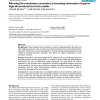Free Online Productivity Tools
i2Speak
i2Symbol
i2OCR
iTex2Img
iWeb2Print
iWeb2Shot
i2Type
iPdf2Split
iPdf2Merge
i2Bopomofo
i2Arabic
i2Style
i2Image
i2PDF
iLatex2Rtf
Sci2ools
102
click to vote
BMCBI
2008
2008
Allowing for mandatory covariates in boosting estimation of sparse high-dimensional survival models
Background: When predictive survival models are built from high-dimensional data, there are often additional covariates, such as clinical scores, that by all means have to be included into the final model. While there are several techniques for the fitting of sparse high-dimensional survival models by penalized parameter estimation, none allows for explicit consideration of such mandatory covariates. Results: We introduce a new boosting algorithm for censored time-to-event data that shares the favorable properties of existing approaches, i.e., it results in sparse models with good prediction performance, but uses an offset-based update mechanism. The latter allows for tailored penalization of the covariates under consideration. Specifically, unpenalized mandatory covariates can be introduced. Microarray survival data from patients with diffuse large B-cell lymphoma, in combination with the recent, bootstrap-based prediction error curve technique, is used to illustrate the advantages o...
| Added | 09 Dec 2010 |
| Updated | 09 Dec 2010 |
| Type | Journal |
| Year | 2008 |
| Where | BMCBI |
| Authors | Harald Binder, Martin Schumacher |
Comments (0)

